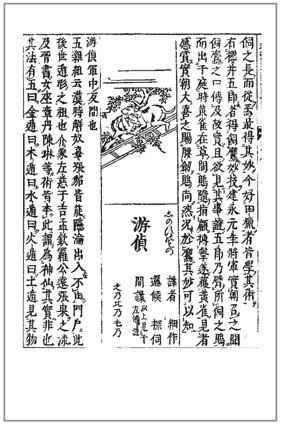In Search of the Niinja (17 page)
Read In Search of the Niinja Online
Authors: Antony Cummins


The
shinobi no mono
entry in the
Wakan Sunsaizuai
encyclopaedia of 1712.
Without becoming laborious, there are multiple names given to spies throughout Chinese history and whilst noting that the Japanese shinobi had access to the Chinese classics, it must be concluded that certain basic names and linguistic roots do cross over, whilst a certain number do not. On its own this does not confirm a relationship between the two and still leaves the possibility that the Japanese ninja obtained some of their arts from investigating the manuals, as opposed to bringing them with them. A further look at linguistics and then the shared skill sets will help form an impression of the events of the ninja ‘Dark Ages’ and the birth of the ninja.
As we have seen, the shinobi themselves believed that their origins lay in China and that these skills were imported in some fashion. The origins of the ninja are discussed in the 1712 document
Wakan Sunsaizuai,
which is an encyclopaedia that encompasses the curious and the mundane in Edo period Japan and is similar in approach to the
Encyclopaedia Britannica
. The commentator describes a Chinese origin for the ninja and quotes from Chinese manuals to support his theory. The most interesting aspect of this document is the reference to the five famous skills of hiding, the
Gotonpo
, a skill set which is attributed solely to the ninja but which have its origins elsewhere (and to date cannot be found in any ninja manual). The entry and descriptions of the skills themselves are fantastical and supernatural and show a belief in the shinobi as ‘masters of the mysterious’. However, this belief in the supernatural is tempered by the comment that the ninja are an essential part of any army and are a pragmatic part of warfare. That the commentator believes that those ninja of Koka are the premier ninja of the day is interesting, as supremacy often changes between Iga and Koka. The encyclopaedia entry translates as follows:
Shinobi No Mono 49
49
[Alternative list of names given]
Shinobi no mono 50
50
Saisaku
Rako
[Unknown reading]
Kancho
The Kanja is a required member of the army, the [Chinese] manual Wu-za-zu states that ‘in the time of the Han Dynasty Kaidoko and Chohyo were both very skilled at hiding and that they never came in or out through doors, these two were the forerunners of the skills of hiding.’
 Kaisho
Kaisho
 Saji
Saji
 Ukitsu
Ukitsu
 Moukin
Moukin
 Rakoen
Rakoen